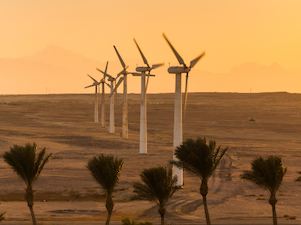The European Bank for Reconstruction and Development (EBRD) continues its support for Egypt’s green transition by issuing a senior secured loan of up to US$ 100 million to Red Sea Wind Energy. The loan will fund the development, construction and operation of a new 500 MW onshore wind farm located in the Gulf of Suez area.
The loan consists of a portion of up to US$ 50 million from the EBRD and a portion of up to US$ 50 million from the Green Climate Fund (GCF) in favour of Red Sea Wind Energy. The loan is co-financed by the Japan Bank for International Cooperation and private commercial banks insured by Nippon Export and Investment Insurance, and is the Bank’s first project to be co-financed by those Japanese institutions.
Red Sea Wind Energy is a joint-stock company incorporated in Egypt and owned by a consortium of sponsors, including Engie, Orascom Construction, Toyota Tsusho Corporation and Eurus Energy.
This will be Egypt’s third private wind farm and it is expected to be the largest in Africa. It will help reduce around one million tonnes of СО₂ emissions per year, the equivalent of taking about 217,000 cars off the road. The energy generated will be sold to the Egyptian Electricity Transmission Company (EETC) over a period of 25 years.
This wind farm is one of the first to be built under the Energy Pillar of Egypt’s Country Platform for NWFE programme, which was launched by the Government of Egypt at COP27 with many institutions, including the EBRD as the lead development partner for the Energy Pillar. It is the first step in deploying an additional 10 GW of renewable energy capacity between 2023 and 2028. It will also help the country achieve its renewable energy target.
Dr. Mohamed Shaker, Minister of Electricity and Renewable Energy, said: “We want to harness Egypt’s natural resources and make full use of the country’s renewable energy potential. To achieve this, the Egyptian government has created an environment that welcomes private sector investment and builds investor confidence to create a diverse and robust mix of international and local investors in renewable energy projects. The 500 MW Gulf of Suez windfarm by the consortium of Engie, Orascom Construction, Toyota Tsusho Company, and Eurus Energy is perfect example of what can be achieved.
Renewable energy projects such as this will also help to cut the country’s carbon emissions, which is in line with Egypt’s vision of 42 per cent of energy consumption coming from renewable sources by 2035, Egypt’s 2030 vision, and Egypt’s National Climate Change Strategy 2050, which aims to mitigate the effects of climate change for sustainable economic development. Egypt has also been working with neighbouring countries to expand its cross-border electricity transmission network, increasing its ability to export its green energy to Europe, Asia and Africa. This project underlines Egypt’s capacity to attract foreign investment. It also shows the importance of national institutions in creating a low risk investment environment and of collaboration with financial institutions such as the EBRD, which has worked with the ministry to maximise the contribution of renewable energy in the energy mix through its partnership with the private sector.”
“To accelerate progress towards the green transition, international cooperation that fosters private sector investment is key. This is the core of Egypt’s country platform for the Nexus of Water, Food and Energy (NWFE) program, where EBRD is Egypt’s lead partner in the energy pillar. Adopting innovative finance tools to foster green solutions, the Red Sea Wind Energy project in the Gulf of Suez effectively utilizes the partnership between the EBRD and GCF, in cooperation with several private sector companies. This project is in line with the country’s commitment to transition towards clean energy and reduce СО₂ emissions across the continent,” said Minister of International Cooperation and Governor of the EBRD in Egypt H.E. Dr. Rania A. Al-Mashat.
Nandita Parshad, Managing Director of the EBRD’s Sustainable Infrastructure Group, said: “We are very proud to support this significant wind farm in the Gulf of Suez, the first for us as lead development partner for the energy pillar of the country’s ground-breaking NWFE initiative. This is a milestone project that will advance a fundamental shift away from Egypt’s reliance on hydrocarbons, create new green business and employment opportunities, reduce pollution and avoid СО₂ emissions. The EBRD is and will proudly continue to be one of Egypt’s key partners on its green transition journey.”
Kavita Sinha, Director of GCF’s Private Sector Facility, said: “GCF is proud to support this initiative, which will be the first wind farm under the programme and the largest in Africa. It is a strong example of the importance of innovative financing models, as Egypt rapidly scales up the deployment of private sector capital to facilitate the adoption of clean technologies at scale.”
Egypt is a founding member of the EBRD. Since the start of its operations there in 2012, the EBRD has invested more than €10.2 billion in 162 projects.


